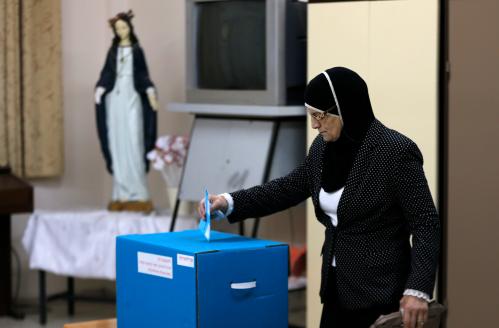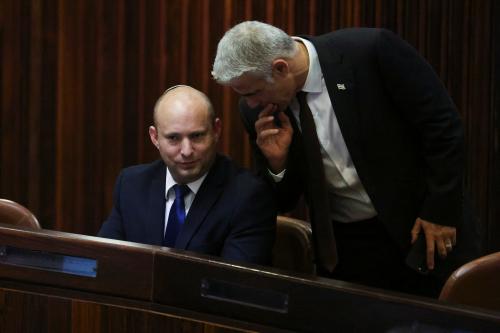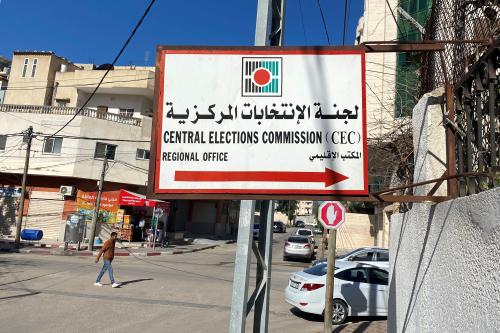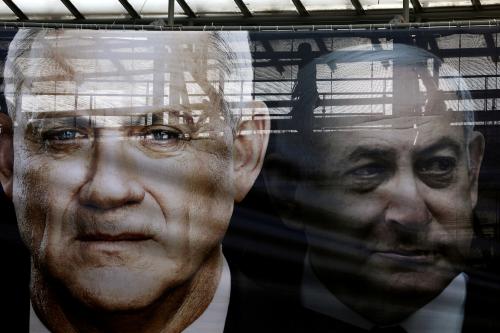Content from the Brookings Doha Center is now archived. In September 2021, after 14 years of impactful partnership, Brookings and the Brookings Doha Center announced that they were ending their affiliation. The Brookings Doha Center is now the Middle East Council on Global Affairs, a separate public policy institution based in Qatar.
During elections on April 9, Arab political parties in Israel narrowly escaped a catastrophic defeat at the polls, as historically low voter turnout threatened to reduce—and possibly even eliminate—their political representation in the Knesset. A late surge in the final hours of voting, which brought the percentage of Arab voters to around 49 percent, ultimately saved the day, with one Arab party coalition, Balad-Ra’am, barely meeting the 3.25-percent threshold for entry by .05 percentage points and securing four seats in the parliamentary body. Together with the other Arab party coalition, made up of Hadash and Ta’al, they combined for 10 seats, down from 13 in the previous Knesset.
While there was some indication ahead of election day that calls in the Palestinian-Arab community in Israel to boycott the vote might impact turnout, the reality that turnout could be extremely low only began to set in on the day of the election. In the city of Nazareth, the largest Palestinian-Arab city in Israel and the political capital of the community, it was hardly noticeable that an election was being held at all. Typical expressions of voter enthusiasm and party loyalty were subdued. At one polling station I entered in the middle of the afternoon, there was not a single voter in the ballot room. Outside the building, political operatives for the major parties frantically worked their phones trying to get people to show up.
The tone of leading Arab politicians changed starkly over the course of the day. In the morning, tweets from political leaders were upbeat and optimistic. But by early evening the messaging had turned to panic. Ta’al party leader Ahmad Tibi said the voting numbers constituted “a real danger.” Mtanes Shihadeh, the head of the nationalist Balad party—which was aligned with the Islamic Movement’s Ra’am party—called the low turnout potential “political suicide.” And Ayman Odeh, the leader of the largest party, Hadash, tweeted “our nightmare” scenario—losing representation in the Knesset—suddenly seemed like a realistic option.
So what happened? Why did a relatively large turnout among Arab voters in 2015, nearly 64 percent, suddenly plunge by 15 points?
Part of this can be chalked up to a simple return to trend. Arab voting numbers had been sliding downward for years as disillusionment with the electoral process and growing alienation from Israeli society as a whole generated increasing apathy among the Arab voting public. Some attrition can also be attributed to voter suppression. The decision to hold national and local elections on different dates is seen as a strategy to suppress the Palestinian-Arab vote in national elections, for instance, since their turnout for local elections—which are more directly linked to their daily lives—is higher. In 2015, however, the four main Arab parties united to form the Joint List. This occurred after some right-wing lawmakers, including Avigdor Lieberman, successfully raised the electoral threshold in a conspicuous attempt to take advantage of Arab political fragmentation and keep their parties out of the Knesset. The unification was a historic moment, and it energized the public. People felt that their leaders had made an important step in transcending their differences, and that it might finally allow them to wield real influence. This didn’t exactly pan out. And when Arab members of Knesset not only failed to capitalize on the opportunity but even failed to keep the coalition together amid petty infighting ahead of the next elections, voters were bitterly disappointed.
But this doesn’t fully explain the widespread calls this time around to boycott the election. While some have characterized the call to boycott as a movement, this description is also not apt. A movement suggests a recognizable degree of organization and an underlying ideology. Yet decisions to boycott the 2019 election were largely made by individuals, responding to a host of (arguably connected) motivations and frustrations.
One of them is a longstanding belief that participating in national elections grants legitimacy to Israeli democracy, which many feel is inherently undemocratic to its non-Jewish citizens. This point of view has caused some groups within the community, namely the Sons of the Village movement and the Northern Branch of the Islamic Movement, to boycott parliamentary elections, instead focusing on local elections and community development. One prominent professor, As’ad Ghanim, called on Palestinian-Arab Knesset members to resign.
This perspective has been steadily gaining traction over the past decade as Israel’s increasingly right-wing governments have passed numerous laws aimed at discriminating against and disenfranchising the Palestinian-Arab citizenry. The most important of these was the Nation State Law, passed last year, which defines Israel’s constitutional identity as exclusively Jewish, without any mention of democracy, equality, or non-Jewish citizens. Indeed, the law explicitly says that self-determination in the state of Israel belongs to Jews alone, thereby excluding Arab citizens from Israel’s determinative self.
Connected to this is the belief that Arab politicians are not able to influence policy, whether they have five seats or 20. Part of this can be explained by the fact that Arab parties have never been included in an Israeli governing coalition, limiting the possibility of such influence. Indeed, during the recent election campaign the main challenger to Benjamin Netanyahu’s Likud party, the Blue and White coalition led by Benny Gantz, explicitly said it would not include an Arab party in its coalition under any circumstances. The very perception of being open to such a possibility is seen as politically damaging in Israeli politics.
This sense of futility is important because it represents a dissatisfaction with the system itself, which can only be addressed by resorting to methods outside of official channels. While many of the newer election boycotters don’t seem to have a clear strategy for what to do once they or their elected representatives are outside the Knesset, most often I hear that the Arab community needs a moment to reassess its goals and determine collectively what it wants and how to move forward together. This moment of soul searching could be as short as a single election cycle, but it is generally believed that the current focus on national elections and gaining Knesset seats distracts from this more important effort, and saps the attention and energy of the public.
Lastly, many people are fed up with their political leaders, pure and simple. There appears to be widespread belief that the Arab political class is motivated more by self-interest than by a desire to serve the public interest. This stems from the observation that they are rarely seen speaking with their local communities except for election time, and that their rhetoric in the Knesset focuses almost exclusively on broader national issues related to Palestinian-Jewish relations, including in the occupied territories, rather than on the everyday needs of their constituencies. In this sense, the politicians have become disconnected from their communities and lost their voters. The breakdown of the Joint List was only the icing on the cake. One goal of the public seems to be to send a message to the politicians that their people’s votes can no longer be taken for granted. If the politicians want to lead, then they need to have a better plan of how to address the needs of their community.
Taken together, this range of grievances helps explain calls to boycott last week’s vote—it wasn’t simple apathy—and makes it more resistant to attempts to galvanize the public using fear of the alternative. Thus, despite the apparent threat that Benjamin Netanyahu and his coalition of right-wing parties pose to Palestinians, boycotters were dismissive of the differences between Jewish-Israeli parties, believing that even centrist and left-wing parties work to harm Palestinian interests.
But was the message heard?
There is no question that the low voter turnout scared Arab political representatives. One senior politician told me that his people had lost hope, and that it was up to the leaders to provide new hope for the future, potentially by building coalitions with Israel’s Jewish leftist parties. But given that both Arab party lists were able to secure representation in the Knesset this time around, it is not clear whether the threat of boycott is ultimately credible. Only time, and perhaps another election, will tell.






Commentary
Why did Arab voter turnout for Israel’s election plunge?
April 16, 2019